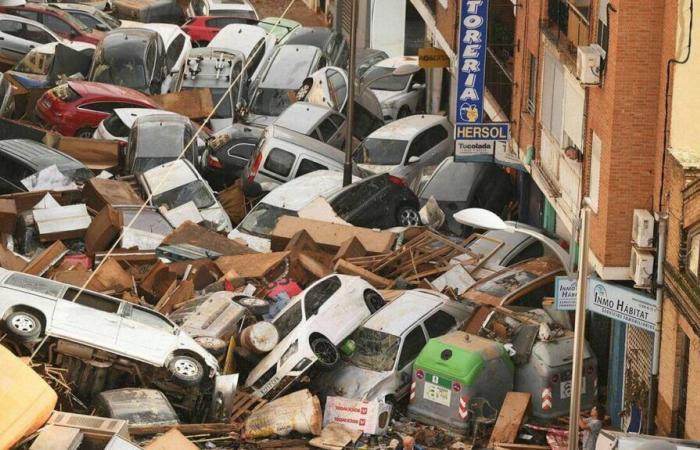No one gets into a car and imagines they will die from drowning while driving around their town. No one sweeps their kitchen thinking that the next day they will need an excavator to dig the mud out. For two weeks, it has been the very real nightmare into which more than 100,000 households in the Valencia region, in the south-east of Spain, have been plunged, hit by torrential rainfall on October 29 and 30, 2024.
Many of us were struck by the surreal images of these tangles of cars in the streets ravaged by the rain. And then, one day chasing the other, we moved on to something else.
In Spain, however, nothing has returned to normal. At the end of the week, the toll from these exceptional rains stood at 224 dead and 16 missing. The Spanish government has announced nearly 15 billion euros in emergency measures to meet the initial needs of disaster victims. Without hiding that the final grade would be much higher. Insurance companies have already recorded 196,000 claims for compensation, 60,000 for housing, 110,000 for vehicles, etc.
“We are better, but we are not well”
After the astonishment of the first days, the residents experienced a chaotic mix of outbursts of solidarity, acts of looting, and health risks. Many lost everything except their lives. Despite the gradual restoration of electricity and major traffic routes, the wounds are far from healed.
Anxiety set in. “We are better, but we are not well,” summed up an elected officialAgence France Presse. Anger is growing against public authorities who have recognized “mistakes” in managing alerts and sending help.
We know that the Mediterranean coast is very exposed to violent rains from the “cold drop”. We also know it is very artificial: 500,000 people live in flood zones in the Valencia region. But have we already forgotten the torrential rains that hit Germany and Belgium in July 2021 (more than 200 deaths)? In France, after the violent drought of the summer of 2023, the North-East, the Center and Burgundy in turn experienced serious flooding.
“Climate calamities are our new reality. And we are not up to the task”, underlined on November 7 the Secretary General of the United Nations, Antonio Guterres, when scientists had just announced that the year 2024 was set to go down in history as the hottest on record.
While in Baku the international community strives to find an agreement on the financing to be provided to developing countries to help them reduce their greenhouse gas emissions and adapt to climate change, it is important to remain attentive to the drama that the Spaniards are experiencing. Are we better prepared than them? Probably not. We train children in schools to deal with the risks of fire or attack. When will the “rain flood” alert exercises be held for the entire population?






